Rauner on Dunkin’s loss
Tuesday, Apr 19, 2016 - Posted by Rich Miller
* From the Morris Herald…
Pointing out how critical it will be for Republicans to win seats in the upcoming election, Rauner referred to the contentious March primary race in which state Rep. Ken Dunkin, D-Chicago, lost his seat.
He said Dunkin lost because he didn’t show up in Springfield for a potential veto override of a Madigan-backed bill designed to limit the governor’s control in negotiating with state employee unions.
“We were able to get one Democrat off of the override, so my veto stood,” Rauner said. “But the Democrat leadership got so cranky … they took him out of the primary. This is the Chicago machine power that we’re dealing with.”
Dunkin also missed another vote that day, to fund the state’s child care assistance program. In the end, nobody but Rauner stood up for him, which was telling.
* Related…
* Rauner ally Dunkin has $1.2M in campaign fund — what will he do with it?: Dunkin did not return phone messages Monday and was listed as an excused absence at the Capitol.
* In Defeat, State Rep. Ken Dunkin Kept A Million-dollar Consolation Prize: “It’s very unusual,” says Kent Redfield, a retired political science professor and a longtime observer of money in Illinois politics. “People are going to speculate as to exactly what was going on,” says Redfield. “Was there an arrangement? Is this a golden parachute?”
51 Comments  
|
Cleaning up Pat Quinn’s mess
Tuesday, Apr 19, 2016 - Posted by Rich Miller
* AP…
A state audit has found that anti-violence programs administered by former Gov. Pat Quinn lost nearly $4 million in questionable expenses or unspent funds never collected.
The review released Tuesday by Auditor General Frank Mautino covered three programs designed to fight violence, including the “Neighborhood Recovery Initiative” that Quinn’s office developed in 2010 as he was running for election to a full term. Questions about program spending helped defeat his 2014 re-election bid.
The audit found problems with how grant recipients were chosen, how contracts were written, how spending was monitored and how unspent funds went uncollected.
Other than that it was fine.
/snark
The full report is here.
27 Comments  
|
* Pennsylvania has a wealthy Democratic governor and a conservative Republican-controlled legislature. Its long impasse finally ended recently when minority party Democrats aligned with the Republican legislative majority…
House Republicans had threatened an override attempt if [Gov. Tom Wolf] vetoed their budget closure package, emboldened by the fact that 13 Democrats had joined them to pass it last week, just hours after Wolf promised a full veto.
The GOP would have needed 16 Democratic votes to override a veto, and top House Republican staffers felt they were within reach of dealing Wolf a politically embarrassing defeat.
Wolf sidestepped questions about that threat Wednesday, saying only that his change of heart was in response to pressure “to do the right thing” by all the interested parties in the dispute.
Publicly, at least, House and Senate Democratic leaders voiced confidence that they could have sustained a veto. But they also readily admitted they didn’t want that fight, and appealed to Wolf to avoid it in recent days.
* And now in Kansas…
After he became Kansas governor in 2011, Sam Brownback slashed personal income taxes on the promise that the deep cuts would trigger a furious wave of hiring and expansion by businesses.
But the “shot of adrenaline” hasn’t worked as envisioned, and the state budget has been in crisis ever since. Now many of the same Republicans who helped pass Brownback’s plan are in open revolt, refusing to help the governor cut spending so he can avoid rolling back any of his signature tax measures.
If Brownback won’t reconsider any of the tax cuts, they say, he will have to figure out for himself how to balance the budget in the face of disappointing revenue.
“Let him own it,” Republican Rep. Mark Hutton said. “It’s his policy that put us there.”
We’ve seen the same thing happen here over and over again. Child care, local government funding, whatever. When our legislators in the same party as our governor rise up and say “Enough!” they get their way.
The movement we’ve seen the past week or so is due in significant part to them. Not all of it, but a lot of it.
Keep it up.
…Adding… The fact that two House Republicans have now signed on to a Democratic higher education funding plan probably guarantees that the bill will move forward. The Rauner folks say they have no problem with the HGOP co-sponsorship.
However, and this is a big however, Democratic Sen. Pat McGuire helped draft the plan sponsored in the House by Republican Rep. Fortner. Also, the Senator who represents the U of I is a Democrat, and he’s likely very unhappy that the House Democratic proposal doesn’t give a dime to his university.
In the end, the Republican plan may be the way to go. Not sure yet, though. They could amend the Democratic bill in the Senate to make it more like Fortner’s.
23 Comments  
|
Beware another criss-cross
Tuesday, Apr 19, 2016 - Posted by Rich Miller
* Keep in mind that the House is preparing to approve HJRCA 5, which does the same thing…
State Senator Tom Cullerton (D-Villa Park) told reporters in a press conference at the State Capitol Tuesday that he expected Senate Joint Resolution Constitutional Amendment 29 to be heard on the Senate floor later this week. SJRCA 29 would abolish the office of lieutenant governor in Illinois, adding it to Arizona, Maine, New Hampshire, Oregon and Wyoming, which do not have the office.
Cullerton was confident his measure would pass out of a Senate subcommittee Tuesday as well as Executive Committee Tuesday afternoon.
“As most people know, I have been successful regarding consolidation on local governments starting in 2013, when I ran SB 494 that looked to consolidate local governments within DuPage County. This is a followup on that effort. The savings we estimate will be $1.6 million a year.”
The measure will go to referendum on this November’s ballot if passed by the Senate and House.
10 Comments  
|
Lots of moving parts in proposed Lucas deal
Tuesday, Apr 19, 2016 - Posted by Rich Miller
* Greg Hinz lays out everything that will have to happen before George Lucas can build his museum at McCormick Place…
If not for the deal, McPier would have to finance more than $200 million in needed maintenance in the Lakeside Center, which is east of Lake Shore Drive—money the agency doesn’t have, they said. But to get that money, the city is cutting an unusual deal with museum patron George Lucas, a deal that will have to be approved not just in Chicago but in deadlocked Springfield.
Under the plan, Lucas would front the city the $743 million that construction of the museum was estimated to cost at its original lakefront site. McPier then would borrow about $1.17 billion, using the Lucas money as collateral of sorts.
Roughly $500 million would be spent for the new convention space at King Drive and $665 million to partially demolish and cap Lakeside Center and to build the museum and related green space on top.
The city would pay that and related debt service on the bonds. But eventually, more money would be needed; Koch and Healey said it would come from shifting to McPier a 2 percent hotel tax that originally was imposed to build U.S. Cellular Field for the White Sox. That levy, which now goes to the Illinois Sports Facilities Authority, would go to McPier after 2032, when it is due to expire, and be continued through 2066.
In addition, Emanuel wants to extend McPier’s tax authorization power to 2066. And, in exchange, the agency would give up after 2022 $15 million in state “incentive” funding it gets to lure conventions here.
All of that would have to be approved by the Legislature and signed into law by Gov. Rauner.
* Mayor Emanuel is publicly optimistic…
Legislators who are up for re-election in November likely would fear being tarred as tax-and-spend politicians if they voted for the mayor’s museum plan, but Emanuel contended Tuesday that it’s visitors, not city residents, who are being taxed — even though many tourists come from the suburbs and downstate.
“There’s a hotel tax, which is visitors that come to the city of Chicago,” Emanuel said. “And so fees that already exist, it’s not new taxes.”
Emanuel also described the spending as a way to keep the city prosperous.
“I would say the right thing to do is invest in the future,” Emanuel said. “While Springfield has its challenges, those challenges do not inhibit the ability to grow the cultural, educational and business and economic future of the city in Chicago. One of the largest employers in the city is the convention and hospitality industry.”
* Hal Dardick at the Trib is not optimistic…
The mayor’s new plan got a noncommittal reception at the Capitol, where spokesmen for House Speaker Michael Madigan and Senate President John Cullerton, both Chicago Democrats, said they’d have to look at the details before commenting. A spokeswoman for Republican Gov. Bruce Rauner declared the matter “under review.”
The list of unresolved issues in Springfield is long, with school funding, a CPS bailout, lack of a major construction program, the budget impasse and Rauner’s pro-business, union-weakening agenda at the top.
Given that, Laurence Msall, president of the nonpartisan Civic Federation budget watchdog group, questioned whether the mayor’s plan was coming at an appropriate time.
“In the midst of a state budget crisis that has prevented the legislature from addressing some of the most basic requests of the city of Chicago and the Chicago Public Schools, it is difficult to see how this enormous request for state resources fits into the priorities of the city and the state of Illinois’ financial crisis,” Msall said.
21 Comments  
|
* Bernie Sanders also won the 13th Ward, but there’s been no word from Speaker Madigan about what he plans to do. Lynn Sweet…
Rep. Dan Lipinski, D-Ill., a “superdelegate” to the Democratic National Convention, said if there is a contested convention, he will be for Bernie Sanders because he won his congressional district in the Illinois primary.
Every Illinois House member is a superdelegate, a nickname given to the Democratic Party honchos who automatically are delegates to the convention, at the Wells Fargo Center in Philadelphia July 25-28. […]
“As a Democratic member of Congress, I have a vote at the Democratic National Convention as a superdelegate. Before the Illinois primary I told Democrats in the 3rd District that I decided that I would pledge my vote to whichever candidate won the district,” Lipinski told the Sun-Times in an email.
“When the votes were counted, Sen. Bernie Sanders received 54 percent and Secretary Hillary Clinton received 45 percent in my district. Therefore, if there is a contested vote at the Democratic National Convention in July, I will vote for Sen. Sanders.”
If that doesn’t make your head spin, I don’t know what will. I mean the logic is sound, but Lipinski isn’t otherwise a hipster Bernie dude.
* And speaking of the convention, here’s Lynn Sweet again…
Duckworth said she will attend the Democratic National Convention, which runs from July 25-28 at the Wells Fargo Center in Philadelphia. I’m expecting Duckworth to be assigned a prime-time speaking slot
* Meanwhile, Lynn Sweet looks at a Mark Kirk superpac…
The Independent Voice for Illinois has raised $868,100 since it was founded last year and has $663,204 cash on hand. Its main expense is payments to a firm run by Eric Elk, Kirk’s former chief of staff.
“The Independent Voice for Illinois PAC works to elect individuals who represent the common sense values of Prairie State citizens,” Elk told me in an email.
The biggest donation to the group, $100,000, came from the Ohio-based Murray Energy Corp., whose chairman, Robert Murray, donated to Kirk’s 2010 Senate campaign.
Sweet gets more political scoops per person-hour than anyone I know.
18 Comments  
|
Things really are getting better here
Tuesday, Apr 19, 2016 - Posted by Rich Miller
* From Sarah Leiseca at the Pew Charitable Trusts…
Rich,
The Pew Charitable Trusts’ “Fiscal 50” interactive today updated its 50-state personal income data. The latest figures show that states have benefited unevenly from the nation’s long-running economic expansion. Personal income in all states is higher than before the Great Recession, even though a handful of state economies faltered at the end of 2015.
Adjusted for inflation, personal income in 21 states has expanded faster than in the nation as a whole since the start of the recession. Only in mid-2015 did the final state—Nevada—recover its personal-income losses and return to its pre-recession level.
In the latest year of this post-recession expansion, personal income in all but six states – Iowa, Nebraska, North Dakota, Oklahoma, South Dakota, and Wyoming – continued to make gains.
Click here to see the charts.
* If you sort by growth rate since the Great Recession, Illinois finishes second to last, ahead of only Nevada.
However, if you sort by growth rate over the past year, Illinois is 16th best.
* Blue is growth rate since the recession, green is the 2015 growth rate…
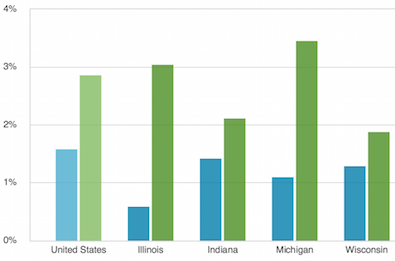
19 Comments  
|
* That graduated income tax poll we talked about yesterday had some more responses which I didn’t have yesterday. For instance…
Now, I’m going to read a list of public figures and organizations. For each, I would like you to tell me if you have a generally favorable, neutral, or generally unfavorable opinion of that person or organization. If you’ve never heard of that person or group, please say so.
The responses…
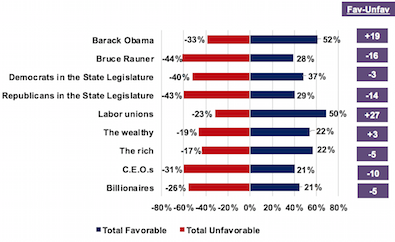
Keep in mind the poll was taken in January. I wish it woulda asked specifically about Speaker Madigan, but the more generic “Democrats in the State Legislature” outpolled Rauner back then? And unions outpolled everything and everyone including President Obama? Interesting.
* More…
As you may know, Governor Bruce Rauner and the state legislature have not been able to agree on a budget. Who do you believe is more to blame for the lack of a state budget?
Responses…
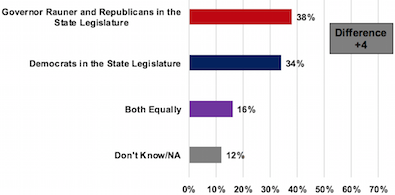
These sorts of numbers may have been why Rauner came roaring back from the holiday break, blasting Democrats wherever he went in January (and February, and March…). It was a distinct contrast to December, when folks seemed to be trying to keep a lid on stuff.
26 Comments  
|
[The following is a paid advertisement.]
Even with the clean air contributions of its current nuclear energy facilities, Illinois is expected to decrease its CO2 emissions by 31 percent by 2030 under the U.S. EPA’s pending Clean Power Plan – the equivalent of removing 5.7 million cars off the road, or more than all of the current passenger cars in the state. Losing any nuclear energy facilities would be a major setback. Here are the facts about nuclear energy in Illinois:
o Nuclear energy is the single greatest provider of clean air energy in Illinois, producing 92 percent of the state’s carbon-free electricity.
o To replace the carbon-free electricity produced by just one nuclear facility, Illinois would have to build a solar farm larger than Springfield or install windmills five miles deep along the state’s entire shoreline of Lake Michigan.
o If all of Illinois’ nuclear energy facilities were to close, it would result in a 130-million megawatt-hour shortage of carbon-free electricity – enough to power more than 11 million homes or twice the number of homes in Illinois!
Nuclear is an irreplaceable part of Illinois’ energy portfolio. Click here to learn more about the value of nuclear energy and its importance to Illinois in meeting the EPA’s Clean Power Plan requirements.
- CASEnergy Coalition
Comments Off  
|
Here comes the criss-cross?
Tuesday, Apr 19, 2016 - Posted by Rich Miller
* Sen. Kwame Raoul’s proposed constitutional amendment to change the remap process is up for a subject matter only hearing today. But he told me this morning that he intends to call it for a vote…
Proposes to amend the Legislature Article of the Illinois Constitution concerning the decennial redistricting of Legislative and Representative Districts. Provides that the Senate, by resolution, instead of “the General Assembly by law”, shall divide the Legislative Districts into 3 groups for the determination of terms of office. Eliminates the requirement that Legislative Districts be divided into 2 Representative Districts. Provides criteria for creating districts. Provides for the General Assembly to redistrict Legislative and Representative Districts by law by June 20. If that fails, provides for the Senate to redistrict Legislative Districts and the House to redistrict Representative Districts, each by resolution adopted by three-fifths of the members elected. If no resolution is adopted by July 20, provides for a Senate or House Redistricting Commission to redistrict by August 20. If that fails, provides for a Special Master. If that fails or a bill, resolution, or plan is invalidated, the General Assembly may redistrict by law. Requires hearings and allows for the public to submit plans. Further proposes to amend the Legislature Article of the Illinois Constitution concerning the decennial redistricting of Congressional Districts. Provides criteria for creating districts. Provides for the General Assembly to redistrict Congressional Districts by law by June 20. If that fails, provides for a Special Master. If that fails or a bill or plan is invalidated, the General Assembly may redistrict by law. Requires hearings and allows for the public to submit plans. Effective upon being declared adopted.
The “criss-cross” is an age-old play. The House passes one version of a reform, while the Senate passes another. Members in both chambers claim they voted for a reform, but nothing ever gets done.
This isn’t the first time Sen. Raoul has pushed this particular remap reform idea. It failed in the House by a single vote a while back, mainly because of GOP opposition. Because of the Jack Franks proposal and the Independent Maps petition drive, I doubt the GOP will climb on board this time, either.
Raoul told me he “doesn’t like” Rep. Franks’ proposal. I’m hearing he wants to kill the Franks proposal, but this will all be up to Senate President John Cullerton, a big fan of partisan redistricting.
Ugh!
17 Comments  
|
React to Munger move publicly muted
Tuesday, Apr 19, 2016 - Posted by Rich Miller
* You’re not going to hear too many legislators gripe about Comptroller Leslie Munger’s decision to put legislative paychecks in the same pile as all other overdue state bills…
“I don’t think anybody’s fazed by it. What we have to do, we will do,” said Democratic Rep. Lou Lang of Skokie, an attorney. “She has a difficult re-election ahead of her and she’s looking for every chance she can get to get her name in the paper. It’s what we all do in the political world, but it should just be called what it is.” […]
“I’ll do what the families in my districts have done over the last year. Lean on the credit cards, lean on friends and family,” said Rep. Will Guzzardi, D-Chicago. “My girlfriend will have to take me out to dinner every once and a while. It’ll be tough, but it’s tough all over.”
Rep. Jaime Andrade, D-Chicago, said his legislative salary is his family’s only source of income.
“At least I know I might get a check down the line, but I have residents who know they will never get a check,” Andrade said. “For me, this might be a difficult situation, but for others it’s worse.”
* Mark Brown explains…
As much as state lawmakers might be exasperated with Munger’s maneuver, some of them no doubt seething privately over the projected two-month delay in their paychecks, nobody running for election in November is going to want to challenge her populist decision. […]
As much as state lawmakers might be exasperated with Munger’s maneuver, some of them no doubt seething privately over the projected two-month delay in their paychecks, nobody running for election in November is going to want to challenge her populist decision.
I’ve talked to some legislators about this as well, and many expressed real private worry about their personal financial future. They also know that Munger has plenty of money, as does the governor, the House Speaker and the Senate President, along with the two top GOP leaders. Those folks won’t suffer a minute.
* This, however, is an interesting comment…
State Representative Terri Bryant (R-Murphysboro) supports her fellow Republican’s decision and said she hopes it brings lawmakers closer to a compromise.
“This is probably something that should have happened back in January,” Bryant said.
That’s pretty much what Munger’s Democratic opponent said about it on Sunday.
47 Comments  
|
* A mostly upbeat economic assessment from the Illinois Policy Institute? Yep…
Illinois gained a net 14,700 payroll jobs in March, putting Illinois in the black for jobs in 2016, according to March data from the Illinois Department of Employment Security. The state unemployment rate rose to 6.5 percent in March from 6.4 percent in February, driven by an increase of 9,600 Illinoisans who are unemployed.
Illinois’ March payroll jobs report revealed a second strong month in a row for the state. Illinois added 14,700 jobs on net, with significant gains in leisure and hospitality (+6,300); construction (+4,100); financial activities (+3,200); and trade, transportation and utilities (+2,800). Manufacturing was the only sector to show significant job losses (-3,100) with losses also coming from professional and business services (-1,400).
Illinois’ household survey data, which estimates the raw number of people employed and unemployed regardless of industry, showed Illinois’ workforce grew by 37,700 in March, with employment growing by 28,100 and unemployment growing by 9,600. The growth in the number of unemployed people is the reason the state’s unemployment rate ticked up in March to 6.5 percent from February’s 6.4 percent.
Given that Illinois’ workforce shrank consistently during the recession era, the recent expansion of the workforce is a positive sign, despite the fact that the growing workforce is contributing to Illinois’ rising unemployment rate
I almost choked.
* This may be why…
Illinois’ workforce contracted by over 225,000 from before the beginning of the Great Recession and shrank by 61,000 in 2014 alone. The state’s workforce bottomed out in January 2015, just as Gov. Bruce Rauner took office. But since January 2015, Illinois’ workforce has grown by an impressive 157,400. It’s not immediately clear whether there is a relationship between the expansion of the state’s labor force and Rauner’s tenure as governor. However, a change in workforce sentiment has occurred, and this warrants further investigation.
A commenter wondered whether this represented a “pivot” to the Rauner is great and wonderful for Illinois! rhetoric.
If not, that’s pretty much what it will look like when it happens.
* But it wasn’t all upbeat…
The manufacturing sector shed jobs in most states in the region, with Illinois having the second-worst loss of any state. Only Wisconsin had an especially strong showing on the manufacturing front, gaining more than 4,000 manufacturing jobs. […]
Illinois continues to have the weakest manufacturing recovery in the region. All states experienced a manufacturing jobs bottom in 2009 or 2010. Since each state’s respective bottom, though, Illinois has had the worst manufacturing jobs recovery.
19 Comments  
|
* One “benefit” of the impasse is everybody appears to be learning lots more about budget mechanics. This is a good idea…
Yesterday, the Illinois House of Representatives provided essential long-term assurance to community colleges in the state by passing HB 4675, which would ensure that all future federal dollars distributed to the State of Illinois for Adult Education and Career and Technical Education are timely appropriated to community colleges, even in lieu of a state budget. Currently, these funds are coded within the Comptroller’s Office as “special funds” rather than “federal funds,” which had previously compromised their ability to be distributed in lieu of a higher education budget. Other similar technicalities within the fund distribution process were addressed by previous bills, but did not include the funds outlined specifically by HB 4675.
“While achieving a full and comprehensive state budget remains my highest priority as a legislator, I am very much committed to doing what I am able in the meantime to alleviate the burden of this current impasse, such as sponsoring and promoting legislation like HB 4675 so that institutions and organizations can continue to acquire as many of the resources they are entitled to as possible. I am especially proud to have had this opportunity to assist our community colleges in this way, as I have always been a tireless advocate for higher education in Illinois. There should be no reason for the state to delay the delivery of these federal dollars to their rightful owners, even in the midst of our own financial dysfunction,” said Unes (R-East Peoria).
Community colleges in Illinois have been especially impacted by the now ten-month absence of a state budget. In Representative Unes’ District, these colleges include Illinois Central College (East Peoria) and Spoon River College (Canton).
“Having these federal funds not be held up by other budget discussions allows our community college to plan for future offerings of Adult Education and Literacy Programming. In addition, we are better able to budget for expansion and enhancement of our Career and Technical Education programs. Each of these programs has a direct impact on our regional economy and enhances Spoon River College’s ability to have an educated workforce available for our region’s employers. Not having a hold on these funds allows us to put those federal dollars to work immediately,” said Curt Oldfield, President of Spoon River College.
Currently, 45% of Spoon River College’s budget for its Adult Education programs is comprised of federal dollars, and amounts to about $65,000 annually. They also receive approximately $79,965 in federal Perkins funds, which support their Career and Technical Education programs.
According to Illinois Central College (ICC) Interim President Bruce Budde, ICC receives roughly $400,000 annually in federal subsidies for its own programs of this kind
8 Comments  
|
Madigan advances his constitutional amendment
Tuesday, Apr 19, 2016 - Posted by Rich Miller
* Illinois Public Radio…
The constitution currently says the state has the “primary responsibility” to fund early education through high school. However, the Illinois Supreme Court has ruled it’s a goal, not a mandate. Property taxes pay for most of the public school funding while the state covers about a third of the total.
Madigan said he wants to change the wording so it says education is a fundamental right and it’s the duty of the state to provide it.
“If approved by the voters, the state would be required to fund 51 percent of the cost of education,” he said. Rep. Jeanne Ives, R-Wheaton, said the state would have to come up with billions more to put into education.
Madigan said the legislature could manage how to make this change from relying on property taxes. But Rep. Joe Sosnowski, R-Rockford, said he thinks it would be a challenge to push up its share of state funding quickly if voters approved the amendment.
“Do you think it would be more difficult than the situation we’re in today,” Madigan said.
“If we were required to double the educational funding, I would argue that it would put us in a much more difficult situation,” Sosnowski replied.
The bill passed the committee on a partisan rollcall.
Reps. Ives and Sosnowski are both probably right. It’s hard to argue with the idea behind this. Illinois should’ve been doing it all along. But if the courts order the state to provide 50 percent plus a dollar of all school spending (without any way of reining in that spending), it’ll likely cost taxpayers billions of dollars.
52 Comments  
|
*** UPDATE *** From US Sen. Mark Kirk…
“As Senator for Illinois, I am working with some of the most conservative and liberal voices to do what is right. We are spending about $60,000 per prisoner every year in Illinois to incarcerate individuals who leave prison more dangerous than when they arrived - everyone knows this system is broken. Here at home, we cannot allow another generation of kids to be plagued by gang violence, so the new criminal justice reform bill directs more attention to fight gangs of national significance in Chicagoland.”
[ *** End Of Update *** ]
* Press release…
A new poll released today by the U.S. Justice Action Network, the largest bipartisan organization working on criminal justice reform, shows that registered Illinois voters overwhelmingly support reforms that would fix the state’s criminal justice system. Voters strongly believe that, as a result of mandatory minimum practices, Illinois’ current system imprisons too many people for too long and that judges should have greater discretion in determining sentences. The poll, conducted by Fako Research & Strategies, revealed strong support for reform among Republican and Democratic voters, in addition to bipartisan agreement that the goal of our criminal justice system should be rehabilitation.
“This poll reveals a mandate for criminal justice reform in Illinois,” said Holly Harris, Executive Director of the U.S. Justice Action Network. “The prison population has exploded over the last few decades, and yet we aren’t seeing the public safety return that we deserve. So it’s no surprise that an overwhelming number of voters from the far left to the far right support policies that would reduce prison sentences for low-risk, non-violent offenses and offer more rehabilitation programs for those leaving incarceration. In light of this polling data, we urge lawmakers to take action to support these needed changes to our broken system.”
Among the poll’s top findings include:
* 94% of Illinois voters agree that the justice system should offer more rehabilitation and job training for individuals convicted of low-level, non-violent offenses so that when they re-enter society, they can get jobs, turn away from crime, and get off the taxpayers’ dime.
* 92% of Illinois voters – including 92% of Democrats, 96% of Republicans and 93% of Independents – favor reducing prison time for individuals convicted of low-risk, non-violent offenses in Illinois prisons. They support reinvesting some of those savings to create a stronger probation and parole system that holds offenders accountable for their crimes.
* 87% of Illinois voters– including 89% of Democrats, 91% of Republicans and 86% of Independents – would support replacing mandatory minimum sentences with sentencing ranges so that judges can weigh the individual circumstances of each case, such as seriousness of the offense and the offender’s criminal history, when determining the penalty.
* 83% of Illinois voters – including 82% of Democrats, 88% of Republicans and 82% of Independents – support sending fewer individuals who commit low-risk, non-violent offenses to Illinois prisons so that state funding can be used to keep violent criminals in prison for their full sentence.
* 85% of Illinois voters support spending some of the money Illinois is spending on locking up non-violent offenders should be shifted to strengthening mandatory community supervision programs like probation and parole.
* 90% of Illinois voters – including 92% of Democrats, 90% of Republicans and 92% of Independents – agree that we should break down barriers for ex-offenders so they can get jobs, support their families, and stop being dependent on government services that cost Illinois taxpayers money.
“Criminal justice reform is an issue where Illinois voters recognize the problem that we spend too much tax money keeping non-violent criminals behind bars. Voters also strongly agree that the main goal of our criminal justice system should be rehabilitation,” said Dave Fako, of polling firm Fako Research Strategies.
This poll comes at a time when Illinois is weighing up significant changes to their justice system through recommendations from the Illinois State Commission on Criminal Justice and Sentencing Reform. With U.S. Sen. Dick Durbin leading the charge on federal reforms, U.S. Sen. Mark Kirk recently announcing his support, and Gov. Rauner looking to cut the prison population by 25 percent, Illinois is emerging as a leader on justice reform.
“The results of this poll affirm what Gov. Rauner believed when he within the first days of his election worked with Sen. Raoul and others to create the commission,” said Rodger Heaton, Illinois Director of Public Safety, Chair of the Illinois State Commission on Criminal Justice and Sentencing Reform. “This poll and its results will go a long way towards helping the Commissioners consider even more challenging reforms to our system and to stop what we think has been an over reliance on incarceration.”
“Illinois residents clearly recognize we need to rethink and rework who we put behind bars and why,” said State Sen. Kwame Raoul (D-13th). “Our current system has devastated our communities and not improved public safety. We should pass reforms that ensure our system provides hope and redirection for low-level offenders who do not need to be imprisoned or who should not return once they are released, and to ensure the violent, dangerous criminals are locked away where they cannot continue to wreak havoc on our streets.”
“This poll reinforces the ACLU’s own polling numbers – the public is ready for leaders to take bold steps to safely reduce our prison population and support programs that reduce the number of individuals who return to prison,” said Ben Ruddell, Criminal Justice Policy Attorney, ACLU of Illinois. “We look forward to working with the U.S. Justice Action Network and other bipartisan advocates to advance proposals that will keep us safe and refocuses our justice system on rehabilitation.”
“Illinois spent $1.4 billion in taxpayer money last year but this poll shows that voters realize their justice system is not spending this money wisely,” said Derek Cohen, Deputy Director, Right on Crime. “Voters in the state are urging lawmakers to pass policies that create alternatives to incarceration which are more cost effective and provide better results.”
This is a Fako & Associates poll, so it’s trustworthy.
* A few other noteworthy items I picked from the pollster’s memo…
Reform marijuana laws so that those who possess or use marijuana are provided alternatives to incarceration such as probation and treatment options. (83% Total Support, 62% Strongly Support)
People convicted of possessing a small amount of drugs shouldn’t automatically go to prison, but have the chance at participating in probation and drug treatment. (87% Agree, 69% Strongly Agree)
One‐quarter (26%) of voters believe the Illinois criminal justice system needs “A Complete Overhaul.” One‐third of voters (33%) believe that the Illinois criminal justice system needs “Major Reform” while another quarter of the electorate (26%) feels the system needs “Minor Reform.” One‐tenth of voters (9%) feel that the Illinois criminal justice system is “Working Pretty Well As It Is.”
Respondents were asked which of the following two statements came closest to their point of view regarding prison sentences
Illinois has some of the most overcrowded prisons in the country and that our system needs to be reformed. Other states have created more effective, less expensive alternatives to prison for non‐violent offenders, and Illinois should consider making those changes to our system to save money and lower our crime rate.
Or
People who commit any crime belong behind bars, end of story. It may cost a lot of money to run prisons, but it would cost society more in the long run if more criminals were out on the street.
A solid majority (70%) of Illinois voters agree with the first statement that Illinois prisons are overcrowded, requiring reform for non‐violent offenders. Less than a quarter (22%) of voters agree more closely with the second statement that all criminals should be behind bars, end of story.
Likewise, a strong majority of Democrats (72%), Independents (76%), and Republicans (63%) indicate that their opinion comes closes to the first statement, that Illinois prisons are overcrowded.
Discuss.
* Related…
* Mitchell: Removing stain of arrest a step toward justice reform: And Cook County Sheriff Tom Dart — who put a national spotlight on the injustice of warehousing mentally ill offenders in the Cook County Jail — now is backing a bill to remove a provision of the law blocking anyone with a previous conviction from applying for an expungement… The bill now in Springfield doesn’t allow ex-offenders to erase a conviction. What it does, though, is waive the $120 fee required to apply for an expungement for those who have been released from jail, with the charges against them dropped… Though the expungement bill made it out of committee, supporters are getting pushback from the Illinois State Police and the Clerk of the Circuit Court. These agencies share revenue from expungement applications.
* Editorial: Government shouldn’t seize assets without greater proof of crime
22 Comments  
|
* Politico…
HOPE FOR HIGHER ED? — “GOP proposes stopgap plan for higher ed,” Rich Miller: http://bit.ly/1WcwCnC
– Rauner’s office says it supports this effort, which would draw some $600 million from an existing fund and divert it to stopgap higher ed spending and provide one semester’s worth of MAP grant funding. It would also include changes in procurement code, something the governor’s office has sought.
GLIMMER OF HOPE — House GOP Leader Jim Durkin tells Illinois Playbook that it isn’t all doom and gloom in Springfield: “Contrary to what the press reported last week, I felt the meeting of the leaders produced some positive results. More so than I’ve seen in a long time. I felt better about the level of discussion, I felt better about last week’s meeting than I have in some time. There was some progress made.” Durkin could not get into specifics: “I will leave it at that.”
Subscribers know more, but the train is definitely starting to chug a bit. Keep your fingers crossed.
*** UPDATE 1 *** I’m told by a Rauner administration official that the budget office estimates that the Education Assistance Fund will have $600 million available to fund higher education by the end of Fiscal Year 2016. The Fortner plan and another pushed by House Black Caucus members both rely on the EAF for funding.
Here’s a comparison of what the two plans do…
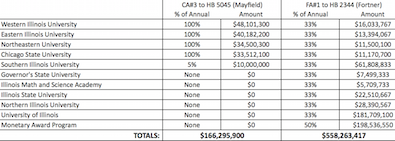
*** UPDATE 2 *** Two House Republicans have now signed on as hyphenated co-sponsors of Rep. Mayfield’s bill, Reps. Norine Hammond and Reggie Phillips.
Things are moving.
30 Comments  
|
Man, I hope this works
Tuesday, Apr 19, 2016 - Posted by Rich Miller
* The House Executive Committee unanimously approved Rep. Jack Franks’ remap reform proposal yesterday. Franks handed out this fact sheet comparing his plan to the Independent Map group’s proposed constitutional amendment…
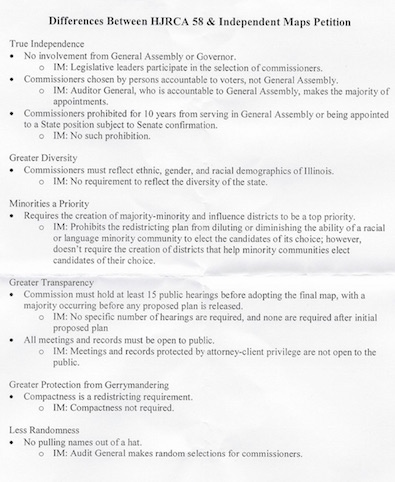
Franks appears to have the best proposal out there right now.
* This is also good news…
Bray said the Independent Maps coalition does not have a position on Franks’ proposal.
That’s the best that can be hoped for at the moment. They should continue gathering signatures and raising money until it becomes crystal clear that the Franks proposal will be on the ballot. At that point, if Franks addresses the issues raised in committee yesterday by Republicans and good government groups, this scenario ought to be avoided…
What happens if both are put on the ballot?
Franks was asked that question at Monday’s hearing and said he’d “defer to counsel.”
What a nightmare that would be. What if they both passed? Worse, what if they both went down because of the confusion?
* This is also good news…
Five organizations filed witness slips with the Executive Committee in support of Franks’ amendment, including Common Cause, the Illinois Campaign for Political Reform and the state Chamber of Commerce.
If Todd Maisch is for it, then partisan sniping can be overcome…
Northern Illinois Republican state Rep. Ron Sandack says to really be fair, [House GOP Leader Jim Durkin’s remap reform] measure should also be considered by lawmakers.
“We ought to be debating something that’s been on file for a year — for a year — and let it have a full vetting and then compare and contrast,” Sandack said.
Sandack is the floor leader. He has to say stuff like that. But I think Franks is right that his is the better idea. Either way, work with Franks to amend his bill and let’s get this train moving now.
I supported a constitutional convention back in the day mainly because I believed we couldn’t get remap reform through the General Assembly. The possibility that the Independent Maps folks might succeed has prodded the House Democrats into action. I truly never thought I’d see this day, so nobody better mess it up. Seriously. Don’t mess this up!
33 Comments  
|
|
Comments Off  
|
|
 Support CapitolFax.com
Support CapitolFax.com
Visit our advertisers...
  ...............
...............
 ...............
...............
 ...............
...............
 ...............
...............
 ...............
...............
 ...............
...............


|
   
|
Hosted by MCS |
SUBSCRIBE to Capitol Fax |
Advertise Here |
Mobile Version |
Contact Rich Miller
|









 “Smile”
“Smile” 












